Definition guide of skin and hair terms. We define skin & hair terms for effective ingredients that get results. Updated regularly.
A | B | C | D | E | F | G | H | I | J | K | L | M
N | O | P | Q | R | S | T | U | V | W | X | Y | Z
C
Ca-Ce Cf-Cl Cm-Cz
- C13-15 Alkane
- C13-15 alkane is a silky, softening emollient.
- C (Vitamin, Serum)
- Vitamin C in food and supplement form supports immune system health and new cell production, including skin and hair. Vitamin C is applied topically for targeted skin-rejuvenation. It is an anti-aging, acne reducing, dark pigmentation fading powerhouse. Vitamin C is a building block for collagen, the support structure of the skin. Vitamin C also fades acne scars and improves sun-damaged skin texture. Best use is applying Vitamin C serum daily and Retinol at night.
- C Ester
- C Ester is a potent, pure and stable form of Vitamin C that is less acidic than other Vitamin C variants. It does not cause as much irritation and redness as other forms of C. It is the recommended form for an oral C supplement and for skin application. The ingredient label may refer to it as C Ester or Ascorbyl Palmitate.
-
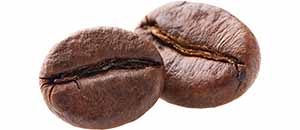
Caffeine, such as found in coffee beans, stimulates blood circulation and reduces puffiness
Caffeine
- Caffeine is common in eye and cellulite creams as it reduces puffiness and inflammation. Caffeine has antioxidant properties and slows down photoaging. On the scalp, Caffeine encourages blood flow to nourish follicles and encourage healthy growth. Caffeine can be drying to the skin if it is not paired with adequate moisturizing products.
- Calcium
- Calcium supplements maintain healthy bones, posture, intracellular signaling, and hormonal secretion. Frequently seen within multi-vitamins.
-

Calendula
Calendula Extract
- Calendula Extract comes from the Calendula flower. Calendula promotes the regeneration of new tissue and soothes damaged skin.
- Calophyllum, Calophyllic Acid
- A rare fatty acid, calophyllic acid, which is found in Tamanu Oil. Various studies verified the wound healing, safety, and antibacterial properties of Calophyllum [1], the principle active catalyst of Calophyllic Acid.
- Camellia Japonica
- Camellia Japonica is also known as Japanese Camellia or tsubaki. It is the authentic Japanese Camellia seen in brands like Tatcha and SK-II. Originally known as an ancient Japanese beauty secret used by Geishas for high shine in hair and optimal skin care. All camellia variants help skin, but Camilla japonica oil is the real deal. An excellent antioxidant and moisturizer, Camellia japonica oil is rich in Omega 9. Omega 9 helps the skin retain hydration. Camellia japonica oil also contains polyphenols, vitamins A, D, C, and E. This non-comedogenic oil promotes skin elasticity. [2] This variant of Camellia oil (Japonica) is more difficult to obtain but worth the effort. It the most effective at transdermal collagen and elastin delivery.
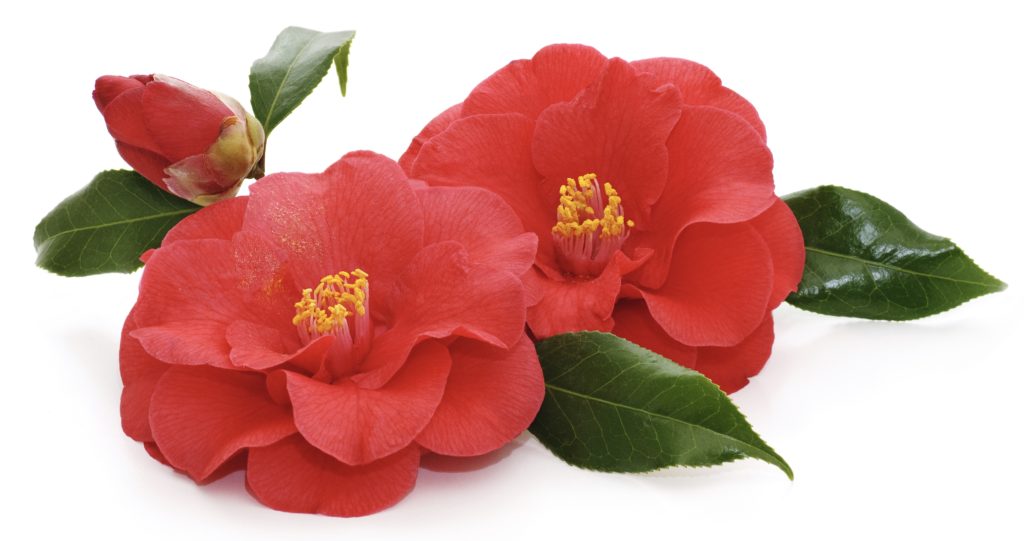
Camellia Japonica is the form of Camellia with the most benefits
-
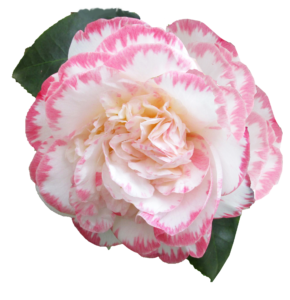
Camilla
Camellia Oleifera Seed Oil
- Camellia Oleifera Seed Oil smooths rough skin patches and repairs the skin barrier. It also smoothes hair in a conditioner or leave-in serum.
- Camelia Sinensis
- Camelia Sinensis is the leaves of green and white tea. It is beneficial as a beverage and when applied topically to skin and hair. It is gentle yet powerful. It contains phenols and EGCG. As a topical ingredient, it evens the skin tone. It is anti-inflammatory and antioxidant. It reduces redness and inflammation around the delicate eye area. White tea also contains EGCG, which enables the production of new cells in the epidermis [3]. It contains phenols to strengthen collagen and elastin. This gives skin a bouncy, younger look while delaying wrinkles. Carapa guianensis is andiroba seed oil. It is cold-pressed extracted from the Andiroba tree seeds of the Amazon Forest. Andiroba seed oil is naturally rich in antioxidants, Vitamins A, C and E, and fatty acids. It is ideal for dry skin types as an emollient that is easily absorbed. It promotes skin elasticity.
- Candelilla Wax
- Candelilla Wax is a vegan substitute for beeswax with similar properties. It works well with other waxes for improved product consistency and to raise melting points without chemicals.
- Cannabigerol (CBG)
- CBG is short for Cannabigerol, a cannabinoid found in cannabis.
CBG is a very important compound found in Cannabis. It is the parent Cannabinoid to CBD.
CBG works with other cannabinoids for an entourage effect on skincare issues such as acne and skin rejuvenation. CBG is an anti-bacterial, anti-fungal, and anti-inflammatory. It is also an antioxidant to fight oxidative stress and aging skin cells.
CBG addresses skin conditions such as moderate photo-damage, eczema and psoriasis. [4]
CBG is found in skin products with Full-Spectrum CBD. It’s presence in a product can be confirmed by the brand with a COA (Certificate of Analysis) report.
- Cannabidiol (CBD)
- A naturally occurring biologically active chemical constituents of hemp or cannabis. CBD oil comes from cannabis sativa L, a form of Agricultural Hemp with all of the benefits of the plant and low THC. Research shows CBD is helpful for skin issues such as acne, aging, eczema, and psoriasis.
- Caprylyl Glycol
- One of the “good” alcohols that binds to moisture. A humectant. Caprylyl Glycol is skin-conditioning. It is an alcohol derived from caprylic acid. Caprylic acid is a fatty acid found in milk, coconut and and palm oil
Caprylic/Capric Triglyceride
- Caprylic/Capric Triglyceride is one of the cleanest ingredients with no reported toxicity, it is safe enough to be food grade. Capriylic Triglyceride naturally occurs in palm kernel or coconut oil. It is a mixed ester composed of caprylic and capric fatty acids attached to glycerin.
- Caprylic/capric triglyceride is a natural skin replenishing emollient that creates a barrier on the skin’s surface, which helps to reduce skin dryness by decreasing the loss of moisture. [5] It can make greasy ingredients leave a non-greasy finish. A gentle ingredient. Caprylic/capric triglyceride creates a barrier on the skin’s surface to reduce moisture loss and address dryness.
- Carapa Guianesis Seed Oil
- Carapa guianensis is andiroba seed oil. It is cold-pressed extracted from the Andiroba tree seeds of the Amazon Forest. Andiroba seed oil is naturally rich in antioxidants, Vitamins A, C and E, and fatty acids. It is ideal for dry skin types as an emollient that is easily absorbed. It promotes skin elasticity.
- Carbomer
- Carbomer is a texture enhancing stabilizer, gives skincare products a gel like consistency. It can increase skin permeation and retention of active ingredients.
Research indicates Carbomer is considered a safe chemical to stabilize a product. It is far less likely to cause a skin reaction compared to other stabilizers. - Carica Papaya Seed Oil
- Papaya Seed Oil is high in Tocopherols and Carotenoids, it’s an antioxidant and improves skin elasticity, reduces wrinkles, moisturizes, and promotes skin cell regeneration.It has an amazing fatty acid profile, including linoleic and Behenic acid. It is exceptionally soothing to dry skin.
Caryocar Braziliensis- Caryocar braziliensis is also known as pequi fruit oil. It is rich in fatty acids.Pequi fruit oil heals acne scars and eczema. It’s rich emollients soothe dry, damaged skin.
Moisturizing and refining, it is high in Vitamin A and E.
- Cassia Angustifolia Seed Polysaccharide
- A botanical hyaluronic acid derived from the seed of the Cassia angustifolium plant.It is high in anti-oxidants and is hydrating.Its’ flavonoid compounds help defend skin’s surface against damage from environmental pollutants.[6,7]
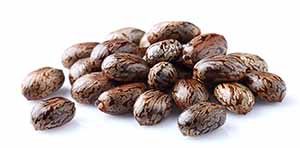
Castor oil seeds
-
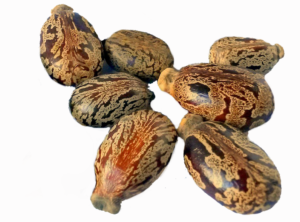
Castor Seeds. Castor seed oil is a humectant
Castor Seed Oil
- Castor Seed Oil is a humectant that moisturizes hair and skin. It reduces inflammation, heals scars and hydrates. Castor Seed Oil is rich in vitamins and fatty acids to nourish both hair and scalp. Castor Seed Oil has been used to promote hair growth. No scientific studies to date correlate Castor Oil with hair regrowth or stop loss. Castor Seed Oil does help barriers to hair growth such as scalp infection, chronically dry scalps, or other scalp inflammation. Castor Seed Oil temporarily plumps the hair with moisture for a fuller and healthier look. It also gives hair more flexibility, protecting new hairs and existing brittle hair. Castor Oil calms frizzy hair and is useful for eyelash growth and conditioning.
-

Sea Grapes
- Caulpera Lentilifera
- Caulpera Lentilifera (Green Algae) Extract is an edible seaweed known as sea grapes or green caviar. It is high in minerals with reported anti-inflammatory and antifungal properties. Caulpera Lentilifera contains fucoidan. Fucoidan promotes fibroblast cell production. Fibroblast cells produce collagen and promote wound healing. Fucoidan renews and brightens the skin while reducing wrinkle depth and skin spot intensity. [8] Caulpera Lentilifera contains Alginic acids to strengthen the lipid barrier, retain hydration and elasticity. Sea Grapes are also rich in amino acids for glowing, supple skin.
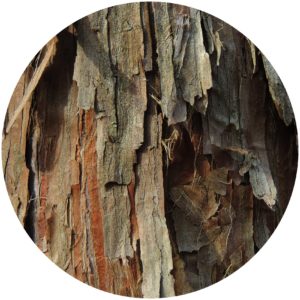
Cedar bark
- Cedarwood Extract
- Cedarwood extract is derived from the needles, leaves, bark, and berries of cedar trees. Cedarwood reduces hair loss by balancing oil production. It also has antifungal and antibacterial properties to keep the scalp healthy. A double-blind, evidence-based method study showed a mix of lavender, rosemary, and cedarwood extract reduced hair loss significantly amongst alopecia areata patients. [9]
- Cehami
- Cehami is a humectant, filling the skin with moisture. It is an extract from an Australian daisy. It is an effective anti-itch analgesic, anti-inflammatory, anti-microbial, and cellular regeneration accelerant. Cehami makes skin look healthier and younger.
- Cellulose
- Cellulose is found in volumizing shampoos to temporarily plump the texture of hair strands.
-
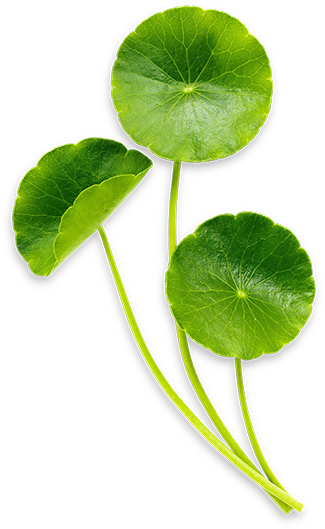
Centella Asiatica AKA Gota Kola improves skin elasticity for firmer skin
Centella Asiatica extract
- Centella asiatica extract is better known as Gotu Kola. Gotu Kola is especially good at improving elasticity and reduce sagging. It boosts antioxidant activity, strengthenings the skin and increases blood circulation. [10]
- Ceramides
- Ceramides are the fatty acids that help to hold cells together and protect the epidermis. Natural ceramides deplete with age or due to excessive stripping of the natural skin oils. Ceramides found in topical formulations come from either plant sources or are created synthetics which are generally considered safe[11]. A few safe ceramides include the following:
- Ceramide-2
- Ceramide-2 is one of the ceramides that hold the lipid barrier which protects the skin. We are born with enough ceramides but lose them with age or sometimes with overly harsh facial washing. Ceramide-2 is used for its’ ability to moisturize and hold moisture in the skin.
- Ceramide-3
- Ceramide-3 is an excellent moisturizing agent, highly useful as a buffer for potent actives. Trihydroxypalmitamidohydroxypropyl Myristyl Ether, AKA Ceramide-3, keeps skin hydrated without being greasy. Ceramide-3 enhances the smooth product finish while repairing the skin barrier. Ceramide-3 keeps skin hydrated without being greasy.
Ceramide AP
Ceramide AP is a long-chain fatty acid ceramide found in the skin. It is one of the primary ceramides. It works well with other ceramides to keep skin hydrated. Decreased levels of AP related to environmental stressors are often correlated with skin barrier conditions such as eczema and psoriasis. Ceramide AP is most effective when topically applied with cholesterol to counteract skin barrier problems.[12]
Ceramide EOP
Ceramide EOP a ceramide that works best with other ceramides and cholesterol to protect the skin barrier and resiliency.
Ceramide NP
Ceramide NP is a ceramide found in the skin. It is a hydrating, anti-aging emollient to protect upper skin layers. Containing fatty acids, it reinforces the skin barrier on dehydrated skin.[13]
- Certified Organic
- Certified Organic is when an Organic Certification Body or organization verifies that an ingredient was grown, prepared, processed and packaged without the use of synthetic fertilizers or chemicals.
- Cetearyl Olivate
- Cetearyl Olivate is a combination of the ester of Cetearyl Alcohol and the fatty acids from Olives. It is not drying because Cetearyl Olivate is moisture attracting and retaining. Olive oil fatty acids have skin-enhancing Omega-3s and polyphenols. These make skin glow! Cetearyl Olivate will not clog pores.
-
REFERENCES
- Lguillier, Teddy et al. “The Wound Healing and Antibacterial Activity of Five Ethnomedical Calophyllum inophyllum Oils: An Alternative Therapeutic Strategy to Treat Infected Wounds. “ PLos vol. 10,9 e0138602. 25 Sep. 2015
- Jung, E. et al. Effect of Camellia japonica oil on human type I procollagen production and skin barrier function. Journal of ethnopharmacology 112.1, 127-131 (2007)
- Food and Chemical Toxicology, January 2000, issue 1, pages 79-96
- Cannabis and Cannabinoid Research, June 2017, pages 139-154
- Hay IC, Jamieson M, Ormerod AD. “Randomized trial of aromatherapy. Successful treatment for alopecia areata.” Arch Dermatol. 1998;134(11):1349-1352. doi:10.1001/archderm.134.11.1349
- International Journal of Cosmetic Science, February 2015, pages 456-463
- Naveed, Akhtar & Zaman, Shahiq uz & Khan, Barkat & Khan, Haji M. shoaib & Ahmad, Mahmood & Rasool, Fatima & Mahmood, Tariq & Rasul, Akhtar. (2011). Evaluation of various functional skin parameters using a topical cream of Calendula officinalis extract. African journal of pharmacy and pharmacology. 5. 199-206
- Fitton JH, Dellâ-Acqua G, Gardiner V-A, Karpiniec SS, Stringer DN, Davis E. Topical Benefits of Two Fucoidan-Rich Extracts from Marine Macroalgae. Cosmetics. 2015; 2(2):66-81.
- Camera E., Mastrofrancesco A., Fabbri C., Daubrawa F., Picardo M., Sies H., Stahl W. Astaxanthin, canthaxanthin and beta-carotene differently affect UVA-induced oxidative damage and expression of oxidative stress-responsive enzymes. Exp. Dermatol. 2009;18:222-231. doi: 10.1111/j.1600-0625.2008.00790.x.
- Gohil, Kashmira J et al. “Pharmacological Review on Centella asiatica: A Potential Herbal Cure-all. “Indian journal of pharmaceutical sciences” vol. 72,5 (2010): 546-56. doi:10.4103/0250-474X.78519
- Burnett, Christina L et al. “Safety Assessment of Ceramides as Used in Cosmetics.” International journal of toxicology vol. 39,3_suppl (2020): 5S-25S. doi:10.1177/1091581820958692
- Skin Pharmacology and Physiology, 2016, pages 135-147
- Panossian, Alexander, and Georg Wikman. “Effects of Adaptogens on the Central Nervous System and the Molecular Mechanisms Associated with Their Stress-Protective Activity.” Pharmaceuticals (Basel, Switzerland) vol. 3,1 188-224. 19 Jan. 2010, doi:10.3390/ph3010188